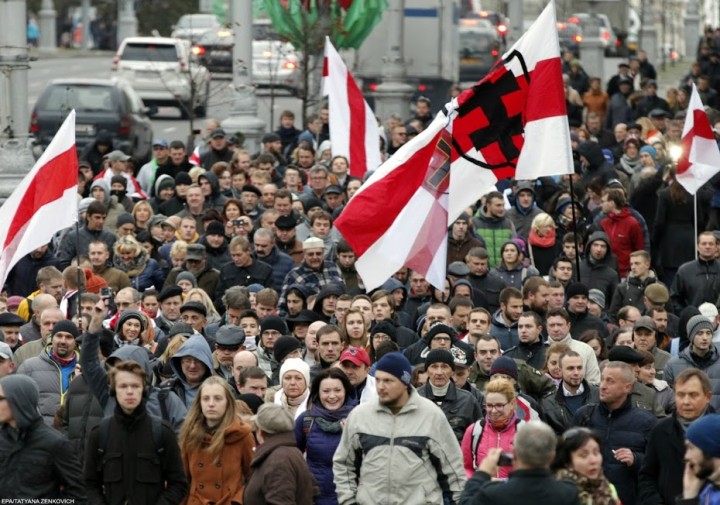Belarus presidential election: “Neither free nor fair, despite lack of violence” – UN rights expert
GENEVA (13 October, 2015) – The United Nations Special Rapporteur on the situation of human rights in Belarus, Miklós Haraszti, today commended that protests against the perceived flaws of last Sunday’s presidential election in the country were not met with violence as in previous cases, but regretted that no progress was made in serving the Belarusians’ right to free and fair election.
“The election process was orchestrated, and the result was pre-ordained,” Mr. Haraszti said. “It could not be otherwise, given the 20 years of continuous suppression of the rights to freedom of expression, assembly, and association, which are the preconditions for any credible competition.”
The expert noted that none of the independent election monitors, both international and local, could verify the officially reported 86 % turnout or 84% endorsement of the incumbent.
“Such high scores have never been claimed in elections in Europe since the end of the Soviet Union,” he stressed. “The observers’ documentations highlighted that not even the four days of coerced participation of prison inmates, army conscripts, and public servants under the label of ‘early voting’, can give up the stated numbers.”
The Special Rapporteur also pointed to the high number of allegations of election-day fraud, such as undocumented handling of voter lists and ballots, voting on behalf of others, carrousel voting, ballot stuffing, voting without proper documents, and mobile voting abuses.
“In my 2013 report* to the UN General Assembly on human rights in electoral processes, I had made a number of recommendations, yet none of these have been followed,” he said. “No independent election commissions with a pluralistic composition had been created; no debates between the candidates were provided in the television media which is largely owned and controlled by the State.”
Mr. Haraszti called attention to the intimidating environment of the electoral campaign. Calls for boycott of the elections were criminalized since the last elections. Political opponents, including an incarcerated 2010 presidential candidate, were released on the eve of the present presidential elections, but none of them have been reinstated in their political and civil rights.
“Actually, at this very moment, criminal proceedings are ongoing against another 2010 presidential candidate,” the expert noted.
The Special Rapporteur welcomed the fact that the elections took place without violence, unlike during the presidential elections in 2010 when a massive crackdown had taken place. “However,” he said, “I will closely follow what happens to the demonstrators in the aftermath of the elections, given that massive arbitrary short-term detentions and administrative discrimination are the order of day in Belarus.”
Mr. Haraszti commented on the temporary four-month lifting of the European Union sanctions against Belarus, beginning in January, as signaled by the foreign affairs ministers of the EU on 12 October, in response to the release of six political prisoners on the eve of the elections. He described the move as “a great opportunity for human rights reforms, in harmony with both the country’s international commitments and the needs of its ordinary citizens.”
Listing possible immediate steps, the rights expert said Belarus could eliminate the oppressive, permission-based regime of public life; repeal article 193.1 of the Criminal Code that criminalizes public activities without official permission; implement the long overdue electoral and media reform that allows for true competition and informed choice; secure the independence of the judiciary; and introduce a moratorium on the death penalty as a transition toward its abolishment.
“Modernisation processes which are not shouldered by democratisation and the respect for fundamental rights and freedoms are neither sustainable nor meaningful”, the Special Rapporteur stated, reiterating his readiness to cooperate with the Government on the starting steps of a reform.
(*) Read the Special Rapporteur’s 2013 report to the UN General Assembly (A/68/276): http://ap.ohchr.org/documents/dpage_e.aspx?m=140
ENDS
Mr. Miklós Haraszti (Hungary) was designated as Special Rapporteur on the situation of human rights in Belarus by the UN Human Rights Council in 2012. In the 70s, Mr. Haraszti was a founder of Hungary’s human rights and free press movement, and in the 1990s he was a Member of the Hungarian Parliament. From 2004 to 2010, he served as the OSCE Representative on Freedom of the Media. Since 2010, he has been a Professor at several universities teaching media democratisation. Learn more, log on to: http://www.ohchr.org/EN/HRBodies/SP/CountriesMandates/BY/Pages/SRBelarus.aspx
The Special Rapporteurs are part of what is known as the Special Procedures of the Human Rights Council. Special Procedures, the largest body of independent experts in the UN Human Rights system, is the general name of the Council’s independent fact-finding and monitoring mechanisms that address either specific country situations or thematic issues in all parts of the world. Special Procedures’ experts work on a voluntary basis; they are not UN staff and do not receive a salary for their work. They are independent from any government or organization and serve in their individual capacity.
UN Human Rights, country page – Belarus: http://www.ohchr.org/EN/countries/ENACARegion/Pages/BYIndex.aspx
For more information and media requests please contact Ms. Alexandra Swetzer (+41 22 917 9401 / aswetzer@ohchr.org) or write to sr-belarus@ohchr.org.
For media inquiries related to other UN independent experts:
Xabier Celaya, UN Human Rights – Media Unit (+ 41 22 917 9383 / xcelaya@ohchr.org)










